Key takeaways:
- Effective budgeting is crucial for program evaluation success, facilitating resource allocation, clarity of goals, and stakeholder confidence.
- Key budget components include staff costs, data collection expenses, and analysis costs; neglecting any can derail the evaluation process.
- Involving team members and stakeholders in budget planning enhances transparency, ownership, and adaptability to unforeseen challenges.
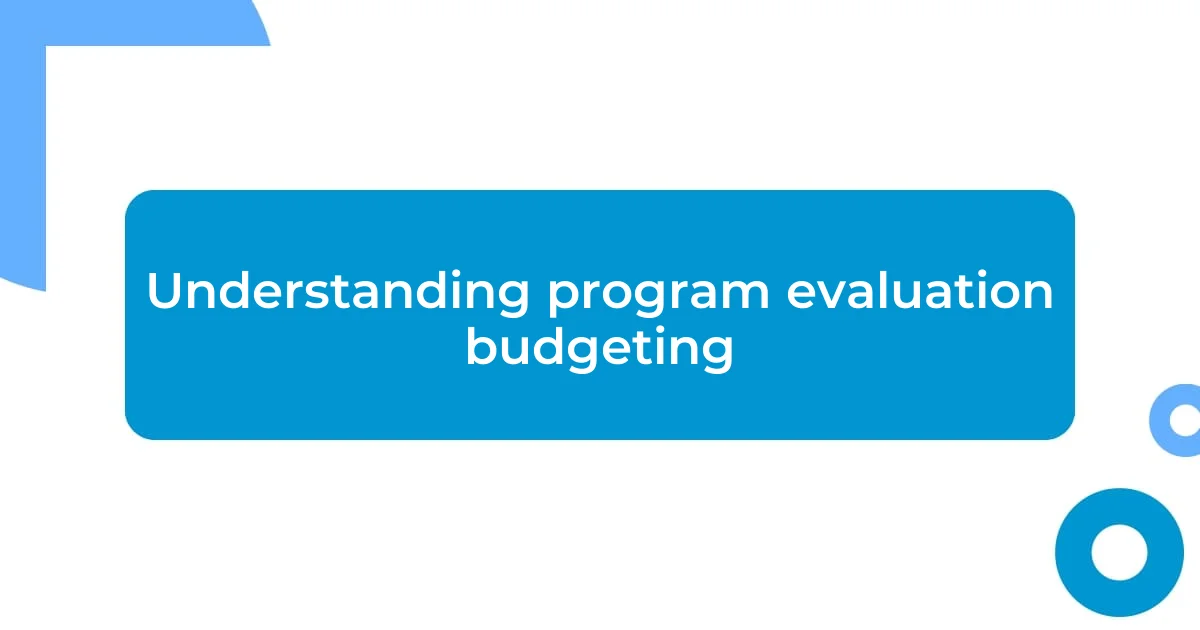
Understanding program evaluation budgeting
When I first encountered budgeting for program evaluation, I quickly realized that it’s an essential, yet complex, part of the planning phase. I remember being overwhelmed by the various components—staff time, data collection costs, and analysis expenses. Have you ever felt that knot in your stomach when you see the numbers on a spreadsheet? That’s the reality of ensuring every dollar aligns with the evaluation goals.
A crucial aspect of budgeting is understanding the specific needs of your program evaluation. I learned this the hard way when I neglected to account for external consultants needed to provide an unbiased perspective. It’s easy to underestimate what it takes to gather and analyze data effectively. Have you ever had to adjust your budget mid-evaluation? I know I have, and it taught me that flexibility is key.
Moreover, I find that transparent communication with stakeholders fosters better budgeting outcomes. When I involved my team in discussions about costs and priorities, it helped us identify gaps and potential overspending. Isn’t it fascinating how collaboration can illuminate blind spots we didn’t even know existed? This approach not only optimized our budget but also enhanced our team’s commitment to the evaluation process.
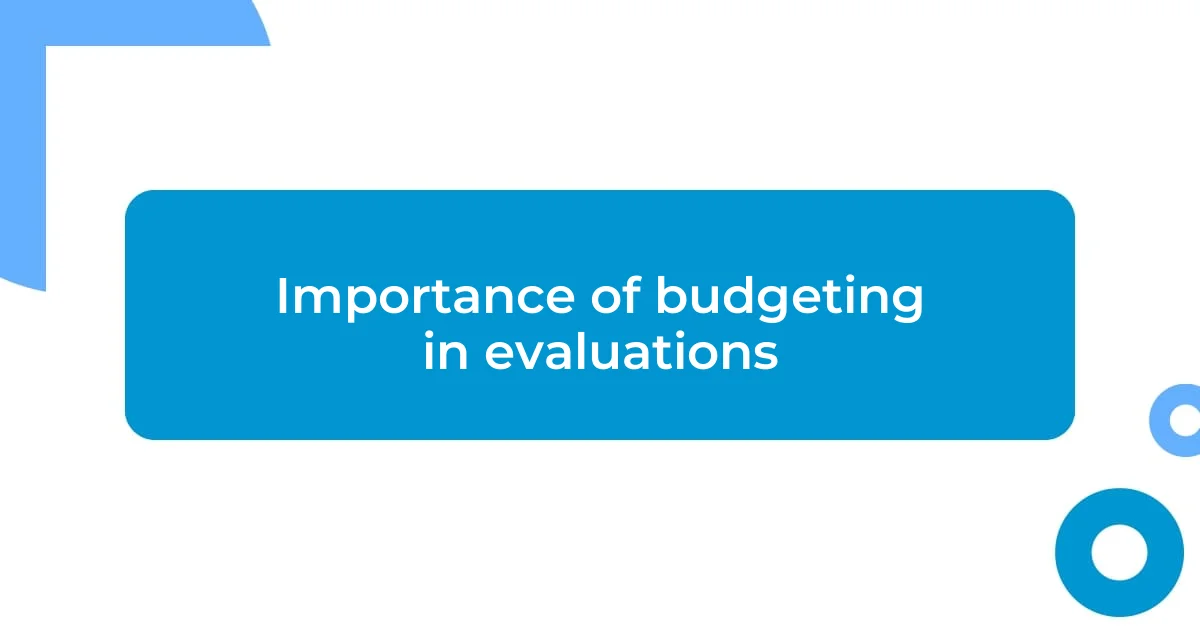
Importance of budgeting in evaluations
Budgeting is like the backbone of program evaluations; without it, the whole structure could collapse. I’ve experienced the sinking feeling that comes when projects unravel due to unforeseen costs. For instance, I once undertook an evaluation where I overlooked funding for essential software tools, and it stalled our entire timeline. It was a real eye-opener, teaching me that having a comprehensive budget upfront not only safeguards timelines but also improves the overall quality of the evaluation.
Here are some key reasons why budgeting is vital in evaluations:
- Resource Allocation: Effective budgeting ensures that resources—like staff and tools—are allocated where they’re most needed.
- Clarity of Goals: A well-defined budget aligns expenses with evaluation objectives and clarifies priorities for the team.
- Stakeholder Confidence: When stakeholders see a well-planned budget, it builds trust and confidence in the evaluation process.
- Risk Management: Having a budget allows for the identification and mitigation of financial risks early on, preventing future complications.
- Performance Measurement: Budgets provide a benchmark against which the actual performance can be measured, facilitating accountability.
When I reflect on the evaluations I’ve conducted, I’m always reminded that good budgeting can be the difference between success and frustration.
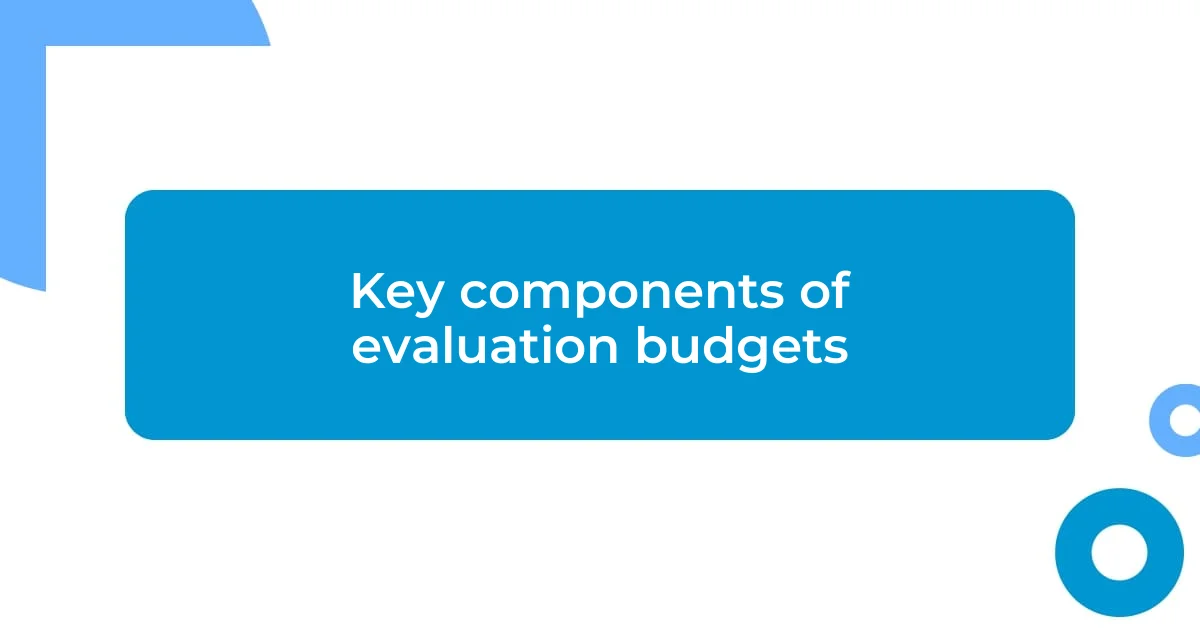
Key components of evaluation budgets
When considering the key components of evaluation budgets, one of the most significant areas is staff-related costs. I can’t emphasize enough how essential it is to accurately account for the time and expertise your team will invest. Early on in my practice, I made the blunder of underestimating the hours required for data collection, which led to us scrambling to meet deadlines. It’s a real game-changer when you prioritize allocating enough budget for the right personnel.
Another critical element in evaluation budgets is data collection costs. In one project, I assumed the data would be low-cost or even free, only to discover that access fees for vital databases were far from negligible. That experience left me realizing how such hidden costs can derail an otherwise thorough evaluation process. Have you ever faced those unexpected expenses? Planning for these potential hurdles by including adequate resources for data acquisition is essential for sustainable evaluation.
Lastly, don’t overlook the importance of analysis costs in your budgeting. The first time I hired a data analyst, the costs surprised me. However, investing in that expertise turned out to be a wise decision that greatly enhanced the quality of our findings. It really brought home the lesson that while it may feel challenging to allocate sufficient budget for skilled analysts initially, the long-term benefits to your evaluation outcomes can be substantial.
| Component | Description |
|---|---|
| Staff Costs | Budget for personnel involved in the evaluation process, reflecting their time and expertise accurately. |
| Data Collection Costs | Include all potential expenses related to gathering data, ensuring there are no hidden costs. |
| Analysis Costs | Factor in hiring experienced analysts to interpret data effectively, enhancing evaluation quality. |
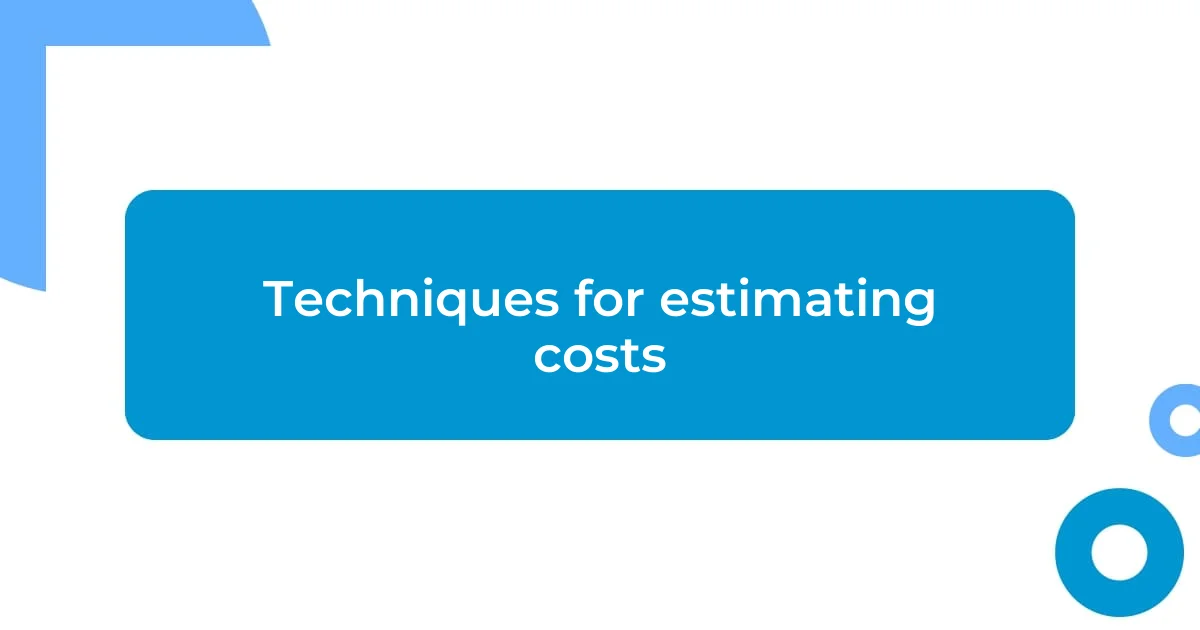
Techniques for estimating costs
One technique I often rely on for estimating costs is creating a detailed itemized list of anticipated expenses. It’s something I picked up early in my career after experiencing a project get derailed by a vague budget. By breaking down every component—staff, tools, data—into specific line items, I can visualize where the money goes. Have you ever tried this approach? It not only helps with clarity but also allows for adjustments before the evaluation kicks off.
Another effective method is conducting benchmark analysis against similar projects. In a past evaluation, I looked at previous budgets from similar initiatives and it was enlightening. I discovered patterns in costs that I wouldn’t have anticipated, which guided me in setting realistic estimates. It made me wonder—how often do we forget to learn from our predecessors? By doing some due diligence in this way, you can save yourself a lot of stress and potential overspending.
Don’t overlook the value of seeking input from colleagues or professionals with relevant experience. When I was designing a budget for a complex evaluation, I reached out to a mentor who had tackled similar projects. The advice I received helped me anticipate costs I hadn’t even considered, such as travel for fieldwork. Engaging with others not only broadens your perspective but also cultivates a supportive network that can really empower your budgeting process. It’s like being part of a community where everyone shares their insights—how reassuring is that?
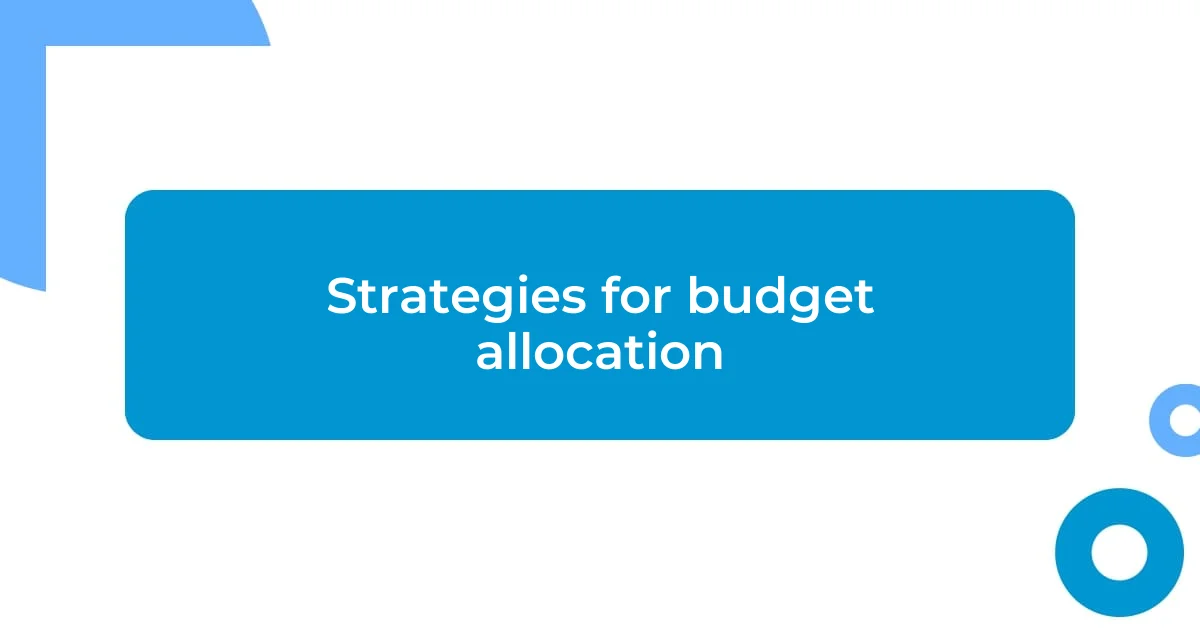
Strategies for budget allocation
When it comes to budget allocation, prioritizing transparency in your cost estimation is vital. I remember a project where we failed to communicate our budget assumptions clearly with stakeholders, and it led to misunderstandings later on. Have you ever found yourself in a similar situation? I encourage you to document and share your budgeting rationale, as it not only builds trust but also ensures everyone is on the same page.
Another strategy I’ve found beneficial is to create a contingency fund within your budget. In one evaluation, I set aside about 10% of our total budget for unexpected expenses, which proved to be a lifesaver. Midway through the project, we encountered unforeseen data collection challenges that required extra funding. Without that safety net, I can’t imagine how we would have navigated those turbulent waters. Isn’t it comforting to know that planning ahead can help you tackle the unexpected?
Finally, I’ve learned the importance of involving team members in the budget allocation process. Involving my colleagues when drafting budgets has repeatedly led to insightful discussions and better resource allocation. For example, during a recent evaluation, one team member pointed out the need for additional training resources that I hadn’t considered. Their input didn’t just improve our budget—it fostered a sense of ownership and commitment among the team. Isn’t it amazing how collaboration can enhance our planning efforts?
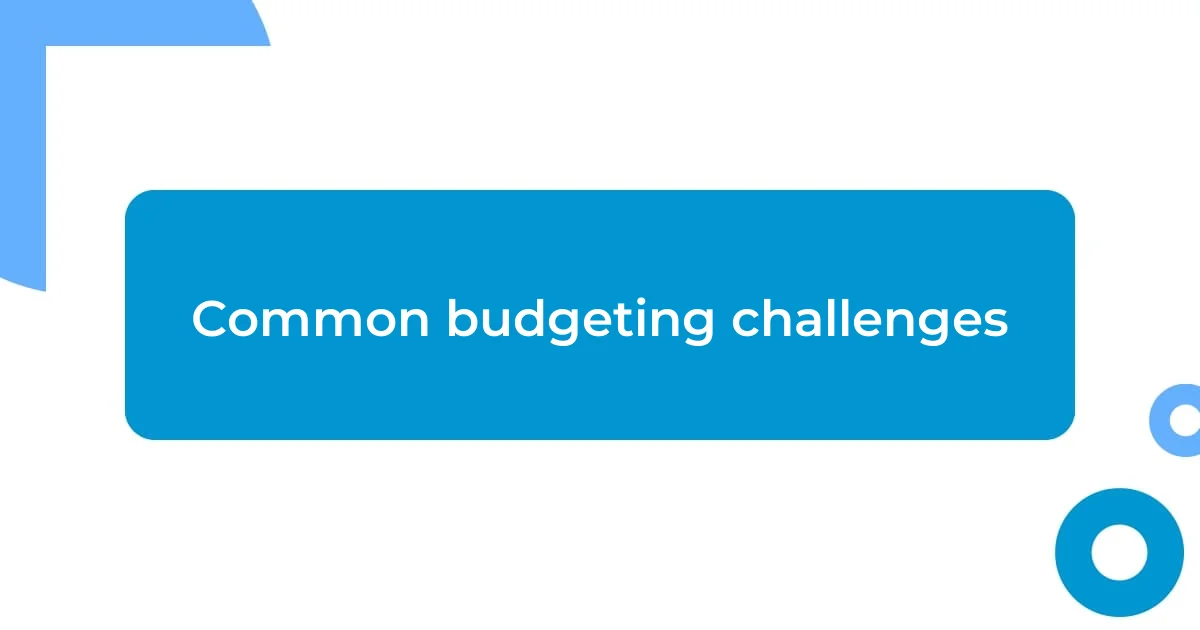
Common budgeting challenges
Common budgeting challenges often stem from underestimating costs, a pitfall I’ve encountered more than once. I recall a project where I thought I had accounted for everything, only to be blindsided by additional expenses like software licenses that hadn’t crossed my mind. It’s frustrating and humbling, isn’t it? Balancing optimism with realistic assessments is crucial; we often want to believe we can do more for less, but that can lead to missed opportunities or dire consequences.
Another challenge arises from shifts in project scope when evaluating programs. I remember a situation where we received new goals mid-project, and suddenly the budget felt inadequate. Have you ever had that sinking feeling when you realize the scope has changed but the resources haven’t? Communicating with stakeholders about such adjustments helped us find a compromise, but it wasn’t easy. Establishing a flexible framework in the budget can go a long way in mitigating these tensions.
Lastly, keeping track of expenditures can be a real headache, especially if multiple team members are involved. During a particularly large evaluation, there was confusion over who was responsible for certain expenses. That experience taught me the importance of setting clear roles and responsibilities in budgeting. Have you ever had to chase receipts or clarify spending? It’s a time-consuming frustration that can be avoided with proper planning and communication from the beginning.
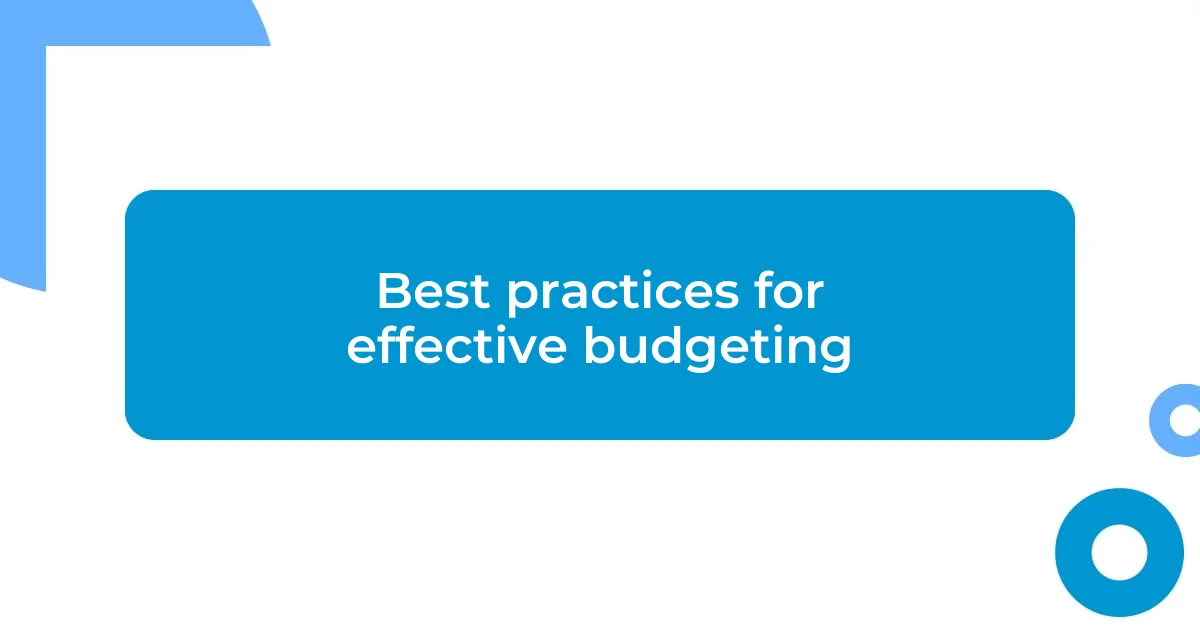
Best practices for effective budgeting
When it comes to effective budgeting, I’ve learned the importance of reviewing historical data from past evaluations. In one project, I meticulously analyzed previous spending patterns, which surprisingly highlighted areas where I consistently overspent. Have you ever found yourself caught off guard by costs that seemed to appear out of nowhere? This approach of utilizing past data not only sharpened my forecasting but also empowered me to set more realistic budget targets moving forward.
Another crucial practice is regularly revisiting the budget throughout the project. I recall a time when I did this mid-evaluation, and to my shock, I discovered we were significantly off track. It might sound daunting—keeping a constant pulse on your finances—but trust me, checking in allows you to pivot before issues escalate. Isn’t it better to course-correct early rather than face a tsunami of financial stress later on?
Lastly, incorporating stakeholder feedback during the budgeting phase can be incredibly impactful. A colleague once shared her insights about community needs that shifted my perspective on what resources were essential for success. Have you ever underestimated the value of input from those directly affected? Not only did it lead to a more grounded budget, but it also reinforced the camaraderie and support for the project’s goal. Engaging others fosters a sense of shared purpose, and who doesn’t want to be part of something bigger?














